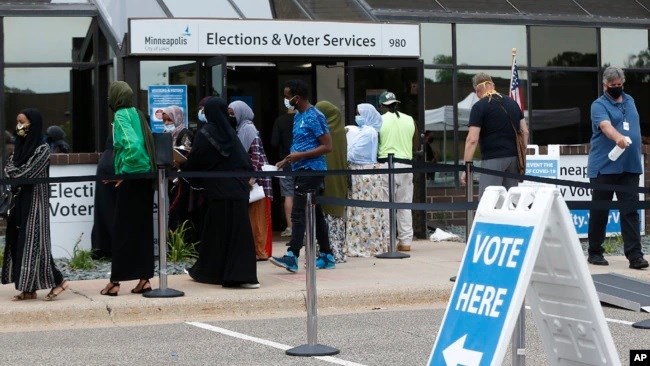
Saturday November 5, 2022
By Mohamed Abdurahman Mohamed Olad

FILE - Voters, among them Somali Americans, line up to cast their ballots in primary elections, at the Minneapolis Election and Voters Services offices, in Minneapolis, Minnesota, Aug. 10, 2020.
From the streets of Minneapolis in Minnesota, home to the largest Somali community in the United States, to the northeast side of Columbus, Ohio, home to the second-largest Somali population, to Maine and the state of Washington, the mindset of the members of the African diaspora community has been focused for weeks on the midterm elections.
This year, despite recent deadly terrorist attacks in Somalia and the fight against al-Shabab, the U.S. midterm election has been a topic of interest and under discussion for the community at restaurants, mosques, community markets and on social media platforms.
“It is another demonstration of political enthusiasm and will as well be a sign of the community's potential elective power in the U.S.,” says Husein Nur, a father of nine children, who fled six years ago from the violence in Somalia.
“We feel excited! And when you see someone you associate with running for public office, someone who wants to represent you in [the] legislature, it really gives you the energy to go out and vote,” says Fadumo Ali Abdi, who runs a shop at Karmel Mall, a Somali shopping center in Minneapolis.
Across the U.S., 11 Somali Americans are running for legislative seats. Some also have been elected to city councils, school boards and the boards of Parks and Recreation in their respective cities.
Among those running for state houses is Democratic candidate Mana Abdi, who will run unopposed in a competitive House district covering part of Lewiston, the second largest city in Maine.
The 26-year-old Democrat was born in a Kenyan refugee camp, and she came to the U.S. at the age of 11. She told VOA's Somali Service about what inspired her to run for political office.
“I want to see better housing, for the people I love, and this community deserves that. I want to see better schools for the community, I have nieces and nephews, I want to see better schools for them,” Abdi said.
“I don’t have the capital to fix those problems, but I do have the time, and I think I have the intelligence to articulate and advocate for policies that will impact their lives positively, maybe not tomorrow but hopefully in five, 10, 20 years. If Allah wills it.”
Abdi says despite many challenges, she was still able to run for election in the country she now calls home.
“There are a lot of factors against me: the age thing, the gender thing, being a Muslim, being an African immigrant,” Abdi said.
Her challenger, Republican Fred Sanborn-Sanders, withdrew from the race August 18, after he posted on Facebook that Muslims "should not be allowed to hold public office."
Abdi says her focus is not on hate speech during the election campaign, but rather is about knocking on doors to ask voters to give her a chance.
“I feel like I can’t force them to like me because those are things I can’t change, and I don’t want to change. But I keep knocking, and I keep showing up. I am running to make sure that I am the voice, I am trying to be the best voice for everybody,” she said. “So, it will be in the best interest for everybody if we can have [a] conversation, so that I know what their needs are, even if they don’t necessarily feel I can be the best representative for them.”
Abdi is not the only Somali-American Democrat running in Maine. Deqa Dhalac, a 54-year-old social worker and the mayor of South Portland, is running for another legislative district in the state.
Almost all of the Somalis running in the midterm election are from the Democratic Party.
Hashi Shafi, executive director of the Somali Action Alliance, a Minneapolis-based community organization says playing a democratic card has always been an easy pathway for Somali immigrants.
“Running as a Democrat has always been easy for Somalis in terms of party regulations and getting access to its leaders,” Shafi said.
Voters of color have been critical to Minnesota Democrats' midterm hopes, but in recent months, Republicans also have been courting communities of color in Minnesota, including Somalis.
Sheikh Tawakal Ismail, a Somali religious scholar and a supporter of the Republican Party, says there are more similarities than differences between the Muslim community and the Republican Party.
“There are differences, including issues related to racism, anti-Muslim rhetoric and hate speeches, but there are a lot of other things we share in common,” noted Ismail.
“I know most of the Somalis vote for the Democrats, and the reason is that most of them live in two democratic districts out of the 87 districts of the state. Now, many of us are moving to Republican areas, so we need to have voices and representatives there, too.”
As the community gets ready for the midterm elections, the Somali-American incumbents and the young new candidates, like Mana Abdi, all have one common goal—to add their voices to the political process in a country they now call home, and to represent a growing immigrant community that now tops 300,000.